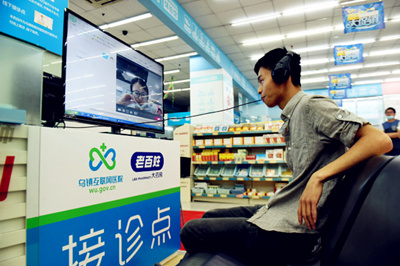By Tom McGregor, CCTV.com Panview commentator and editor
China has entered a 'New Economy' era that favors sustainable development and improved social services even at the risk of slower economic growth rates. Beijing intends to boost its healthcare services nationwide, but daunting challenges lay ahead, such as surging costs, over-crowded urban state-funded hospitals and a declining number of doctors working in the rural countryside.
China's population standing at over 1.4 billion and it must contend with rising rates of chronic illness in patients nationwide. Some medical studies have indicated that a rising number of Chinese have been diagnosed with chronic illness that requires extensive treatment for a long duration of time, which may include regular doctors’ visits, therapy sessions and adhering to prescription medication regimens.
Telemedicine could bridge the gap to revamp the quality of healthcare for urban and rural residents while minimizing medical costs, as well as reducing over-crowded conditions at 'Big City' hospitals.
What is telemedicine?
Telemedicine can best be understood as e-Health, the process of delivering healthcare and health resources through electronic means. Telemedicine is defined as the use of telecommunications and IT (information technology) to provide clinical solutions to patients via smartphones, emails, two-way video conference calls and other wireless devices, such as wearable and wifi-connected bio sensors.

(A man consults a doctor via an Internet telemedicine platform at a drugstore in Hangzhou, Zhejiang province, in May, 2016. Photo from China Daily by Long Wei)
The telemedicine sector can work in an efficient manner, because certified caregivers have access to a wide-range of medical data and studies along with personal e-Health records, while patients can transmit photos of their ailments and discuss health concerns with doctors by using smartphones at any time of day or night to bring added convenience for all involved.
Meanwhile, new advances in the telemedicine industry would provide more hi-tech and convenient services for patients, since users have greater access to information on treatment programs or they can learn more about preventative care. The chronically ill can see fewer emergency care visits to the hospital as a consequence.
Pharmaceuticals saving lives and lowering healthcare costs
Meanwhile, pharmaceutical corporations have spent billions and billions of US dollars on R&D (Research and Development) to bring life-saving drugs to the market. Laboratory scientists have devoted their lives to conduct life-changing clinical studies on medications as they analyze in comprehensive details the corresponding benefits and side-effects for patients. Many of the chronically ill must take prescription drugs on a daily basis, especially those who are elderly or suffering from life-threatening ailments.
Yet prescription pills are only effective when taken as prescribed in a consistent manner, and the elderly often forget to take their medications as scheduled or take the wrong dosage in error. Hence, telemedicine can play a pivotal role to resolve such difficulties.
A few companies are offering automatic pill dispensers connected to the Internet. Such devices have a pre-set alarm system that dispenses the proper pills at the previously arranged time for patients. And if by chance a patient does not respond to the alarm for any given reason, the pill machine will issue an automatic warning via emails or text messages.
Big data brings big efficiency
Telemedicine is a tool to store ‘Big Data’ for the benefit of healthcare providers, health insurance companies, pharmaceuticals and most importantly of all, patients. Health-related communications that are transmitted through electronic communications between patients and caregivers can be stored as information into a cloud-based server along with a compilation of e-Health records.
Additionally, pharmaceuticals can conduct more clinical studies on new medicines by communicating with those being tested on social media platforms. Accordingly, if some people are suffering from adverse side-effects, they can disclose the results immediately on the Internet, which can be stored electronically. And if certain drugs under testing have proven to be effective, the information gets stored as well, which could accelerate procedures to introduce the new drug to the market.
In the Chinese telemedicine market, the top three companies leading the sector are referred to as BAT, (Baidu Inc., Alibaba Group and Tencent Holdings).
Baidu has made numerous advances in AI (artificial intelligence) to deliver AI-assisted doctors and nurses to patients through mobile APPS.
Alibaba has introduced a number of telehealth products and opened up digital hospitals that connect patients with healthcare providers through video conferencing sessions.
Tencent has utilized Big Data with its WeChat Social Media platform to crunch the numbers on regional public health conditions and provide reports and sell them to pharmaceuticals, medical institutions and government agencies.
Offering high-quality healthcare for one-and-all
Telemedicine can be the right solution at the right time for China. All Chinese deserve high-quality care, but let’s be honest it’s impossible to provide top-notch state-of-the-art healthcare facilities in every small and isolated village in the nation, since the costs would be insurmountable to overcome.
Fortunately, telemedicine offers a pragmatic cure to connect today’s rural Chinese residents with highly-qualified 'Big City' doctors. Chronically ill patients, whether they live in cities or the countryside, can also enjoy receiving enormous benefits from utilizing telemedicine as well.
(The opinions expressed here do not necessarily reflect the opinions of Panview or CCTV.com. )

Panview offers a new window of understanding the world as well as China through the views, opinions, and analysis of experts. We also welcome outside submissions, so feel free to send in your own editorials to "globalopinion@vip.cntv.cn" for consideration.
















